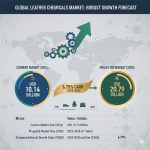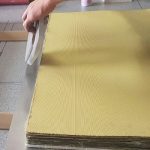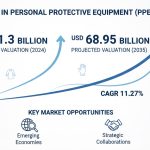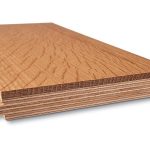Global Vegan Leather Market
As stated in our extensive report; the Global Vegan Leather Market accounted for USD 61.5 Million in the year 2022 and is forecast to reach USD 106.0 Million by 2030 at a CAGR of 9.5%.
One of the most widely exchanged goods worldwide is leather. The leather and leather goods sector contributes significantly to global economic growth. Faux leather, also known as Vegan Leather, is a leather-like material not created from an animal’s hide. Vegan Leather can be made from various naturally existing materials, including cork, pineapple leaves, apple peels, cactus, and recycled plastic, without chemicals or water. Due to growing uses in furniture, footwear, automobiles, clothing, bags, and other areas, the market for Vegan Leather has undergone a paradigm shift. Vendors are concentrating on raising their manufacturing capacities as a result. Several companies dominate the fragmented global industry. These businesses’ emphasis on forward and backward integration throughout the value chain to increase efficiency and total productivity has led to high entry barriers. Leading actors started collaborations to create new, inventive Vegan Leather for the creation of new prototypes and the commercialization of it for a variety of uses.
Click To Get a Free Sample On the Research Study

Factors Influencing Global Vegan Leather Market Growth
The growth of the global Vegan Leather market can be attributable to the following:
- Factors predicted to drive the development of the Vegan Leather market over the forecast period include the rising demand for natural ingredients and the increasing consumer preference for vegan/vegetarian products.
- The number of people adopting a vegan lifestyle has considerably increased due to consumers’ growing knowledge of animal cruelty and their increasing ethical and environmental concerns. Fashion houses are actively looking for a workable, non-animal leather substitute due to this shift in customer preferences. As a result, the market for Vegan Leather has consequently increased.
- Vegan Leathers, such as premium artificial leathers and those made from recycled polyesters, are becoming increasingly popular on the market due to growing worries over the environmental impact of the leather industry.
- Key market players in the Vegan Leather industry will benefit from the growing use of Vegan Leather by significant automakers like Volkswagen, Mercedes-Benz, and Tesla, opening up lucrative possibilities for this market worldwide.
On the other hand, the expensive R&D costs associated with producing biodegradable Vegan Leather are anticipated to only slightly impede the market’s expansion.
North America Region to Take Over the Market
Due to the rapidly growing footwear and automotive sectors, the North America Vegan Leather market has experienced significant market growth with the highest CAGR. It is expected to maintain its lead over the coming years. Due to the country’s robust growth in the automotive and footwear end-user sectors, China has the largest Vegan Leather industry in the Asian region. Additionally, the demand for passenger and commercial vehicles has been driven by the rapid population and disposable income rise, especially in developing nations like China and India.
Conclusion
The overall Vegan Leather market sales have been favorably impacted by the growing demand for natural ingredients and the consumers’ increasing propensity to purchase vegan and vegetarian products.
The well-known players of the Global Vegan Leather Market include Adriano Di Marti (U.S.), Kuraray Co. Ltd. (Japan), H.R. Polycoats Pvt. Ltd. (India), Yantai Wanhua Group Co. Ltd. (China), Alfatex Italia (Italy), BASF SE (Germany and others.
![[Market Research Reports] – Research Google News Blog | VMR.Biz](https://www.vmr.biz/wp-content/uploads/2022/12/logo-removebg-preview.png)











